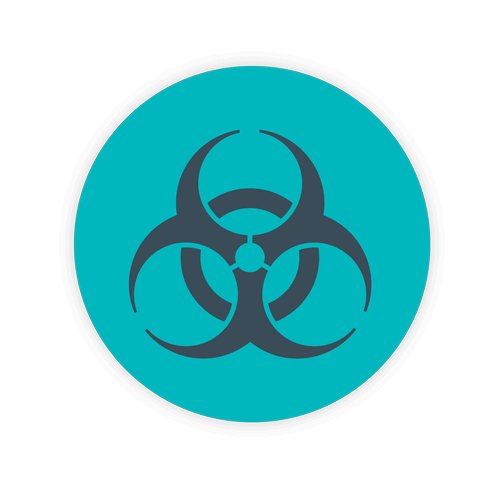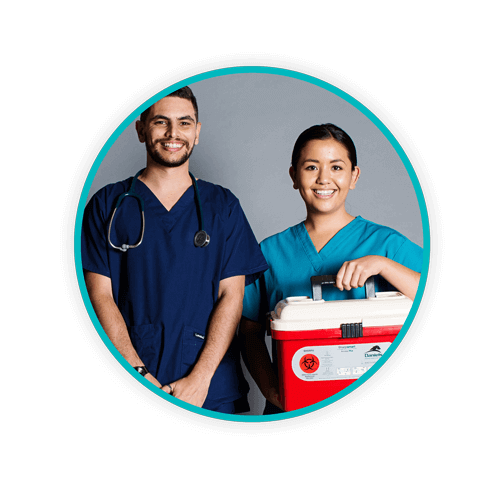Guide to South Carolina Medical Waste Regulations

Every state in the country has its own specific guidelines regarding medical waste disposal. In South Carolina, a majority of regulations for biohazard waste, other types of medical waste, and overall healthcare waste management fall under the guidelines of South Carolina’s Infection Waste Management Act.
Of course, federal guidelines also apply, so it’s important to always be familiar with guidelines of the Resource Conservation and Recovery Act (RCRA) - legislation under the purview of the Environmental Protection Agency (EPA).
Before digging into some of the basic guidelines of South Carolina’s medical waste laws, it’s vital for any facility producing medical waste to realize that it’s ultimately responsible for it. Healthcare waste segregation and healthcare waste management are the responsibility of the waste generator. It’s not just an ethical responsibility, but a legal one.
Basics of South Carolina’s medical waste regulations
Waste regulations for any state can be found under that state’s Code of Regulations. South Carolina’s code of regulations in regard to infectious waste management requirements are found in (R.) 61-105. In these regulations (updated in 2015), South Carolina medical waste generator facilities or businesses will find a number of helpful sections regarding rules and regulations. Some of those include but are not limited to:

- Definitions (always extremely important, as definitions of different types and classifications of medical waste are slightly different between states. Pay special attention to general definitions as well as definitions of infectious waste.
- Generator requirements, including small quantity generators
- Segregation requirements
- How to properly label containers
- Storage of infectious waste
- Infectious waste transportation requirements
Of course, at Daniels Health, we’re aware that it would be impossible to mention all of the important rules, scope, and specifics found in South Carolina’s medical waste regulations, but giving you a starting point to dive deep into regulations is our focus.
For example, are you aware that in the state of South Carolina, a “small quantity generator” defines an in-state generator as one that produces less than fifty (50) pounds of infectious waste per calendar month?
Also per state guidelines and definitions, South Carolina defines infectious waste as: “an infectious waste is any used material which is: generated in the healthcare community in the diagnosis, treatment, immunization, or care of human beings; generated in embalming, autopsy, or necropsy; generated in research pertaining to the production of biologicals which have been exposed to human pathogens; generated in research using human pathogens; and which is not excluded in (2) below and which is listed in the categories below… [the entirety of all full definitions are not found below. Refer to the document for detailed descriptions]:
- Sharps. Any discarded article that may cause puncture or cuts, including but not limited to: needles, syringes, Pasteur pipettes, lancets, broken glass or other broken materials, and scalpel blades.
- Microbiologicals.
- Blood and blood products. All waste unabsorbed human blood, or blood products, or absorbed blood when the absorbent is supersaturated, including but not limited to: serum, plasma, and other components of blood, and visibly bloodied body fluids such as suction fluids, excretions, and secretions.
- Pathological waste.
- Contaminated animal waste.
We also suggest that medical waste generators throughout the state pay specific attention to segregation requirements. For example, “generators shall segregate infectious waste from solid waste as close to the point of generation is practical to avoid co-mingling of the waste. If infectious waste is put in the same container is other waste, or if solid waste is put into a container labeled as infectious waste, the entire contents of the container shall be managed as infectious waste …”
We urge our clients to take the time to read through these regulations. We know it’s time-consuming. We know it’s often boring. We know that it can be difficult to find specific information. That’s why we’re giving you a brief intro here!
As you might surmise, great emphasis in South Carolina’s healthcare waste management regulations apply to infectious or hazardous or biohazard waste disposal. The type of containers used, how such waste is stored, and labeling of containers must be followed to the letter in order to avoid potential non-compliance.
Fines for not properly segregating, storing, labeling, or transporting waste can trigger infractions during inspections that can cost a facility tens of thousands of dollars daily, for as long as the infraction continues and is unresolved.
Did you know?
Did you know that in South Carolina, once infectious waste leaves the generator site, that waste must be delivered to a treatment facility within 14 days (without refrigeration), or within 30 days, but only if that waste is maintained at or below 42°F? Are you aware that all storage areas containing potentially infectious waste must be labeled with the universal biohazard symbol sign?
How about this? Medical waste generators are responsible for assuring that infectious waste is packaged based on requirements of the state of South Carolina in order to prevent any release of infectious waste from its packaging. This means during storage, transportation, or transport off-site. In addition, any waste that is transported by the U.S. Postal Service “must meet the packaging requirements for infectious waste in the domestic mail manual.”
In addition to state guidelines, knowledge and understanding of periodic updates provided by the Environmental Protection Agency (EPA) to Federal Hazardous Waste Regulations (40 CFR 260- 273) must also be followed.
As per the federal government, South Carolina’s Department of Health and Environmental Control (DHEC) must update regulations if the federal guidelines are more stringent than that of the state. However, if the federal updated guidelines are still not as stringent as those of South Carolina’s DHEC, the state is not required to adopt them (although it usually does in order to mean consistency with federal regulations).
For your reading pleasure, South Carolina’s Hazardous Waste Management Act is found under Chapter 56 of the South Carolina Code of Laws Title 44 under Health published by the South Carolina Legislature.
Stay compliant to avoid fines and penalties
At Daniels Health, we’ve said it before, and we’ll say it again. Understanding general guidelines is often not enough when it comes to healthcare waste segregation, waste stream identification, and medical waste disposal. It’s in the details. We know you’re busy, but every medical generator (large or small) is responsible for what happens to their medical waste throughout the disposal process, even after the medical waste removal company you hired takes it off the property.
The phrase, “The buck stops here” is applicable to all healthcare facilities. Proper handling of infectious waste is your responsibility and any non-compliance issues and fines will fall directly on your shoulders.
For more information on how Daniels Health can help your facility stay on top of ever-changing guidelines and regulations, contact us today. Alternatively find out more about our Delaware operations and service capabilities on our South Carolina service page here.
